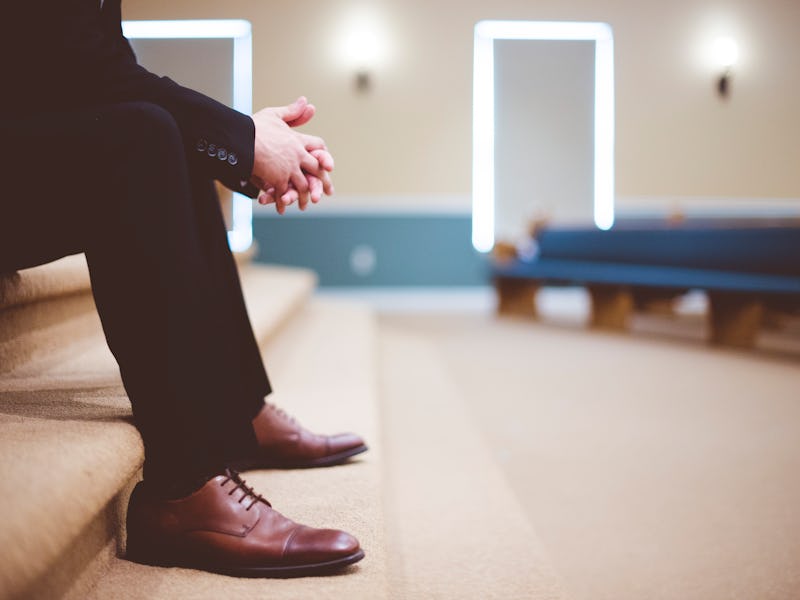Psychologist Finds 2 Easy Strategies to Beat the Stress of Waiting for News
"Our goal wasn't to eliminate the stress of waiting, but rather to make it a little easier."

The anxiety of waiting can be brutal. Whether you’re waiting on GRE scores, job application news, health test results, or any other weighty piece of life information, some strategies for coping are more effective than others. One powerful way to deal with that sense of anxious foreboding, scientists argued in a recent paper in the Journal of Positive Psychology, is to have your mind blown.
"…awe is generated through experiences that help us recognize the ‘bigger picture’ in some way."
According to research conducted by scientists at University of California-Riverside’s “Life Events” lab, one good way to deal anxiety-ridden waiting is to have an “awe experience.” Psychologist Katharine Sweeny, Ph.D. describes this as a moment that helps you lose yourself in the grandeur of life.
“Typically, awe is generated through experiences that help us recognize the ‘bigger picture’ in some way, often through observing grand natural phenomena, profound human experiences (e.g., birth, death), or incredible human accomplishments,” Sweeny tells Inverse.
An "awe-experience" is usually a moment when you lose yourself in something incomprehensibly beautiful or moving.
That could include something like a moving piece of music or art, or even an incredible scene from nature. For the 729 undergrads who participated in Sweeny’s experiments, all it took was a high-definition sunset set to an instrumental score.
Two Ways to Wait Better
Sweeny’s experiments on awe experiences fit in neatly with her previous work. In 2017, she published a paper in the Personality and Social Psychology Bulletin showing that mindful meditation reduced feelings of anxiety in law students who were awaiting their bar results. In particular, guided mediation focused on mindfulness helped law students who were already prone to distress.
“We actually have some research on mindfulness meditation, which seems to help people cope more effectively with the stress of waiting,” Sweeny says.
Meditation isn’t for everyone, but her new work suggests that having an awe experience may have the same effect. Importantly, it appears to work in a different way.
Mindfulness and meditation helped law students process their anxiety, but awe experiences tend to bolster positive emotions.
In Sweeny’s first experiment, 330 undergrads took a fake intelligence test and then waited for their results. In the second, 399 students were led to believe that their peers were rating their personalities and first impressions after a five-minute conversation.
As they waited for the results of both stressful interactions, they either watched a video of cute animals (nice, but not awe-inspiring per se), a “neutral” video of a padlock being made, or the awe-inspiring sunset.
"… meditation and awe provide two different routes to alleviating the stress of waiting."
In both experiments, Sweeny found evidence that awe-based experience boosted positive mood in those moments of anxious waiting — though she notes this wasn’t the case for everyone. For some, the cute animal videos boosted mood more than the sunset video did.
The results present a contrast to her earlier work with the law students, in which meditation helped students manage anxiety. Awe, she supposes, helps cloak it.
“In other words, meditation and awe provide two different routes to alleviating the stress of waiting — meditation seems to work through a bolstered capacity to cope, whereas awe buries stress under a blanket of positive emotion,” she explains.
Why a Little Bit of Worry Is Okay
Life shows up on its own terms, and there’s something to be said for combating stressful experiences head-on and working through those emotions. Sweeny maintains that there’s no technique that can completely rid someone of the the worries of waiting for information as serious as bar results or findings from a medical exam. In this paper, she and her team even make the case that we shouldn’t try to excise all of our worries.
"Worry motivates people to prepare for the worst, and evidence suggests that it does so successfully, buffering the blow of bad news if it arrives."
“Worry motivates people to prepare for the worst, and evidence suggests that it does so successfully, buffering the blow of bad news if it arrives,” they write.
In other words, it’s natural to stress a little and prepare yourself for new information, but it’s important not to let things get out of hand, as Sweeny notes. The aim of her work was just to make worrying a little easier to handle.
“Our goal wasn’t to eliminate the stress of waiting, but rather to make it a little easier,” she says.
For moments when it all just gets to be too much, there’s something to be said for losing yourself in an awe-inspiring experience. Even if it’s just for the minutes it takes to scroll through some deeply satisfying nature photos.
Abstract:
Waiting for uncertain news is a common and stressful experience. We examined whether experiencing awe can promote well-being during uncomfortable periods of uncertainty. Across two studies (total N = 729), we examined the relationship between trait awe and well-being as participants awaited feedback on a novel intelligence test or ratings from peers following a group interaction. These studies further examined the effect of an awe induction, compared to positive and neutral control conditions, on well-being. We found partial support for a relationship between trait awe and well-being during waiting periods, particularly with positive emotion. We also found partial support for the benefits of an awe induction: People consistently experienced greater positive emotion and less anxiety in the awe condition compared to a neutral control condition, although these benefits did not always improve upon the positive control experience. Importantly, these benefits emerged regardless of one’s predisposition to experience awe.